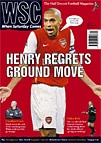 The hooligans of Buenos Aires don’t confine themselves to football, reports Martin Gambarotta. Though when they’re not busy hiring themselves out as political thugs, they cause plenty of disruption
The hooligans of Buenos Aires don’t confine themselves to football, reports Martin Gambarotta. Though when they’re not busy hiring themselves out as political thugs, they cause plenty of disruption
Politics and football inevitably mix in Argentina and the product is not always good. Politics here means primordially one thing: the ruling Peronist party – a vast political machine. The latest crisis hitting football involves the usual: violence in derbies, allegations that hooligans (known here as barrabravas) turn up late at night to lecture players and speculation that the long reign of Julio Grondona as the head of the country’s FA is about to end. But it started with a massive fight not during a game, but in a political arena.
On October 17, rival trade unions clashed in a brawl, carried live on television, during a pompous ceremony to move the body of former president Juan Perón, dead since 1974, from a dreary city cemetery to a new leafy resting place in Buenos Aires province. Rival truck drivers and construction workers were left licking their wounds and rarely had the violent connection between football’s barrabravas and politics been made so evident.
A probe revealed that many of those fighting under the banner of the construction workers’ union branch from La Plata, the provincial capital, were members of the barrabrava of first division side Estudiantes de La Plata. A leader of the Estudiantes fans, currently serving a jail sentence and not involved in the violence, told the press that those barrabravas who fought for the construction workers were small fry willing to rent out their services to the highest bidder. Political gangs – often on government salaries, he said – were now turning to commanding and controlling football gangs as weekend entertainment (and to enhance their political clout in the process).
After the battle over Perón’s body, he alleged, a BMW stopped at the front door of his house and bullets were fired – this, presumably, having been the work of the irate truck drivers. Other, more qualified observers also believe political machines such as the Peronist party now control the barrabravas. Roberto Lavagna, a former minister for the economy credited with having pulled the country out of the recession and now a likely opposition presidential candidate next year, said the nation’s politicians “finance and use” the gangs.
Lavagna made his comments on November 21, the day Grondona huddled with federal government officials to find a way out of the crisis, which had degenerated badly since the fight between the unions. Racing, scheduled to play Boca Juniors in a derby the Sunday after Perón’s botched second funeral, announced they would make use of their right to admission by not letting into the ground 15 of the visiting team’s barrabravas, including their notorious leader Rafael Di Zeo. But Di Zeo’s attorney filed an injunction before a provincial judge alleging he was being discriminated against. The judge, later reported to be a Boca season-ticket holder, ruled in favour of the barrabravas, infuriating Buenos Aires province government officials who called off the game.
Even before October 17, things had been edgy in the first division. A game between Gimnasia de La Plata and Boca was called off on September 10 when referee Daniel Giménez wouldn’t start the second half because he claimed he had been threatened by Gimnasia’s president, Juan José Muñoz, during a changing-room confrontation at the break. The second half was played on November 8. By then Gimnasia had been thrashed 7‑0 in the La Plata derby by an inspired Estudiantes, captained by Juan Sebastian Verón. Estudiantes were thus in contention for the title, putting up a strong challenge against leaders Boca. Before the staging of the missing 45 minutes, members of Gimnasia’s barrabrava showed up at the team hotel and allegedly told players they should throw the game against Boca. Reports said the fans had vowed to “pump bullets into the legs of players” if they didn’t lose the game. Boca won 4-1.
Referee Giménez later acknowledged that “something strange happened in the second half”. But six Gimnasia players failed to accuse the barrabravas directly when a prosecutor, who opened an investigation, summoned them to testify in a La Plata. The players only admitted to having had a friendly conversation with the fans.
The Independiente v Racing derby was also halted by violence on November 13, in the middle of the second half. Independiente were winning 2-0 when Racing fans clashed with police. The Buenos Aires province governor announced after the match that the provincial police were no longer willing to monitor barrabravas in their territory, as they do usually on game days.
Grondona, aware of talk that he was about to be thrown out of the AFA out by a coup, announced drastic measures, barring away fans from the last four games of the season. Yet even this measure was short-lived when Racing and San Lorenzo fans, unhappy with the decision, prevented the buses carrying their teams from leaving for a game, which had to be postponed. The players’ union said it would strike if players’ safety was not guaranteed but also if away fans were not allowed into games. After this the government, reports said, prodded Grondona into considering deducting points as a way to coerce fans into behaving.
As a result of the government pressure, Grondona, who has opposed such a move in the past, said he was now willing to make full use of a rarely used system which can lead to clubs losing points. “You have been warned,” he told them.
From WSC 239 January 2007. What was happening this month